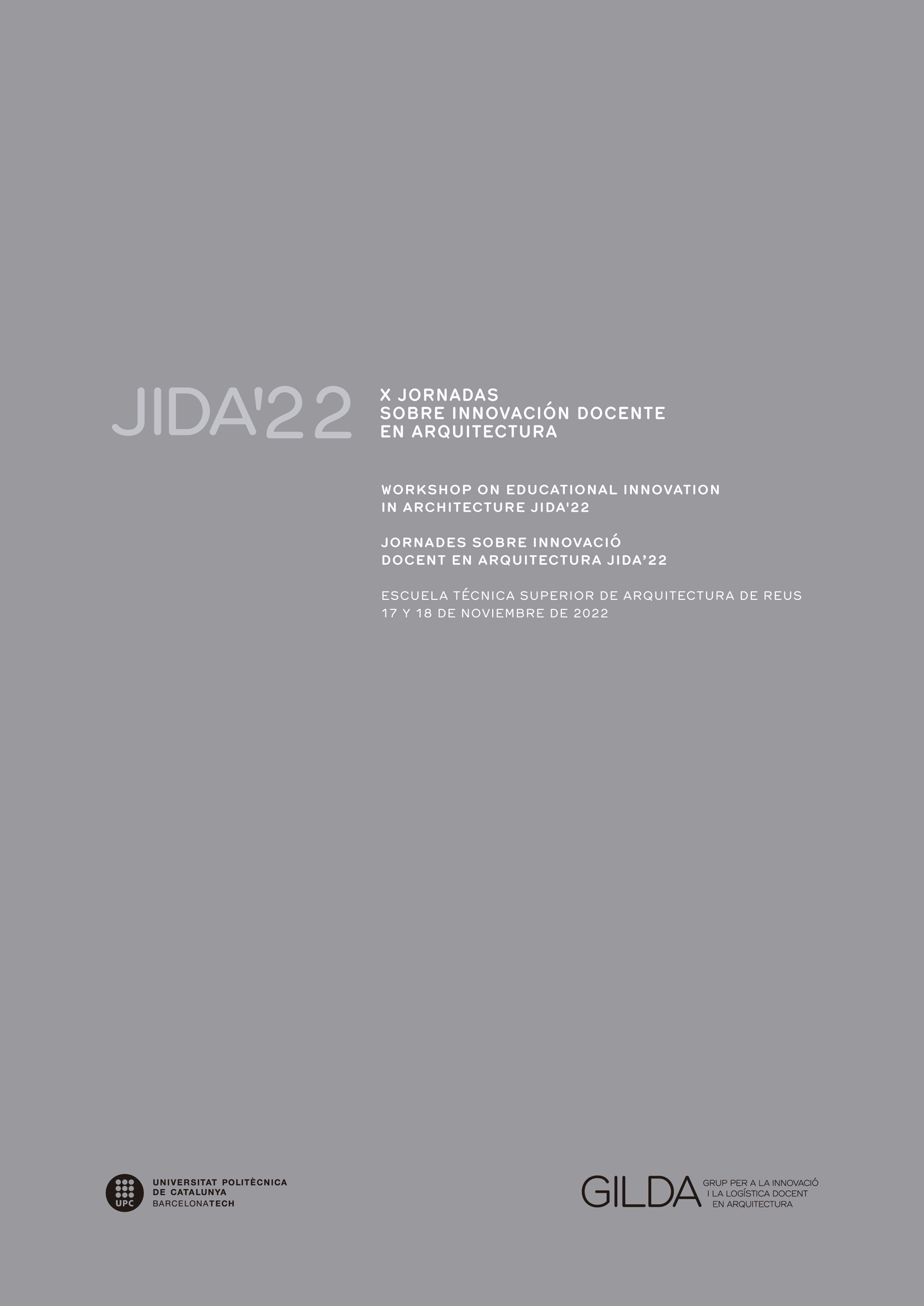Observation and critique
about a starting point in the learning of Projects
DOI:
https://doi.org/10.5821/jida.2022.11554Keywords:
social conscience, contemporary living, critical thinking, values formation, virtual classroomAbstract
This text focuses on the starting point of learning in Architectural Design, that which corresponds to the first weeks of the students' training in the Degree. Its goal is to offer, through the presentation of a specific teaching methodology, a reflection on the relevance of starting the teaching of Architectural Design by introducing students to the social commitment that is inherent in the architectural practice. To this end, a concatenated experience developed in two workshops that were part of Course Arq(Cero) of the Degree in Architectural Foundations at the University of Seville in September of the 21/22 academic year is presented. The workshops were specifically focused on awakening in the students a critical attitude towards the assumed spatial models in housing and the city.
References
AGUILAR CARRASCO, María Teresa y LÓPEZ LOVILLO, Remedios María. (2021). “Reflexión guiada como preparación previa a la docencia de instalaciones en Arquitectura” en García Escudero, D. y Bardí Milà, B. (eds.) Libro de actas de las IX Jornadas sobre Innovación Docente en Arquitectura (JIDA'21), pp. 414-423. Barcelona: UPC IDP; GILDA. <https://doi.org/10.5821/jida.2021.10561>
AWAN, Abeeha, LOMBARDI, Davide y AGKATHIDIS, Asterios. (2022). “Efficacy of Gamification on Introductory Architectural Education: A Literature Review”. Pak, B., Wurzer, G. y Stouffs, R. (eds.) En: eCAADe 2022 Conference Proceedings (09. 2022. Ghent). Ghent: eCAADe (Education and research in Computer Aided Architectural Design in Europe) y KU Leuven Faculty of Architecture.
COUCEIRO, Teresa. (2019). Alejandro de la Sota, maestro de arquitectos. Álvaro-Tordesillas, A. (gestión de la edición). Valladolid: Escuela Técnica Superior de Arquitectura de la Universidad de Valladolid.
DAVYDOVA, Olga. (2018). “Innovation in architectural education” en International Journal of Advance Research in Education & Literature, vol. 4, núm. 12, pp. 1-7.
BRKOVIĆ DODIG, Marta y GROAT, Linda N. (2020). The Routledge Companion to Games in Architecture and Urban Planning: Tools for Design, Teaching, and Research. Nueva York: Routledge.
EBENEZER, Jazlin, SITTHIWORACHART, Jirarat y NA, Kew Si. (2022). “Architecture students’ conceptions, experiences, perceptions, and feelings of learning technology use: Phenomenography as an assessment tool”, en Educ. Inf. Technol., vol. 27, pp. 1133-1157. <https://doi.org/10.1007/s10639-021-10654-5>
ELSAMAHY, Eslam Mohamed. (2017). “An Investigation into using Digital Games-Based Learning in Architecture Education” en Architecture and Planning Journal (APJ), vol. 23, núm. 3, art. 3.
FIES, Carmen y MARSHALL, Jill. (2006). “Classroom Response Systems: A Review of the Literature” en Journal of Science Education and Technology, vol. 15, núm. 1. DOI: 10.1007/s10956-006-0360-1
FINKEL, Donald. (2008). Dar clase con la boca cerrada. Valencia: Universitat de Valencia, Servei de Publicacions.
GOLI, Amir, TEYMOURNIA, Fatemeh, NAEMABADI, Maedeh y GARMAROODI, Ali Andaji. (2022). “Architectural design game: A serious game approach to promote teaching and learning using multimodal interfaces”, en Education and Information Technologies. <https://doi.org/10.1007/s10639-022-11062-z>
JAVID, Ali. (2014). “Creativity in architecture design education: Design as puzzle solving. International journal of design”, en Education, vol. 8, núm. 2, pp. 11-21.
KOKOTSAKI, Dimitra, MENZIES, Victoria y WIGGINS, Andy. (2016). “Project-based learning: a review of the literature” en Improving schools, vol. 19, núm. 3, pp. 267-277.
LÓPEZ SÁNCHEZ, Marina. (2021). “Reaccionar, asimilar, reformular: un Ciclo de Mejora en el Aula aplicado a la docencia de Proyectos Arquitectónicos” en Porlán Ariza, R; Navarro Medina, E., Villarejo Ramos, A.F. (eds.) Ciclos de Mejora en el Aula. Año 2020. Experiencias de Innovación docente de la Universidad de Sevilla, pp. 841-862. Sevilla: Editorial de la Universidad de Sevilla. <http://dx.doi.org/10.12795/9788447231003.040>
LÓPEZ SÁNCHEZ, Marina y VICENTE GILABERT, Cristina. (2021). “Metodologías y recursos para la enseñanza virtual de Proyectos I” en Martos Martínez, A., Barragán Martín, A.B., Molero Jurado, M.M., Pérez Fuentes, M.C., Simón Márquez, M.M., Gázquez Linares, J.J. (eds.) Innovación Docente e Investigación en Ciencias, Ingeniería y Arquitectura: Nuevos Enfoques en la Metodología Docente, pp. 99-108. Madrid: Dykinson.
PORLÁN ARIZA, Rafael, et al. (2017). Enseñanza Universitaria. Cómo mejorarla. Sevilla: Editorial Universidad de Sevilla.
PORLÁN ARIZA, Rafael, NAVARRO MEDINA, Elisa y VILLAREJO RAMOS, Ángel Francisco. (2021). Ciclos de mejora en el aula. Año 2021: experiencias de innovación docente de la Universidad de Sevilla. Sevilla: Editorial Universidad de Sevilla.
PORLÁN ARIZA, Rafael, NAVARRO MEDINA, Elisa y VILLAREJO RAMOS, Ángel Francisco. (2020). Ciclos de mejora en el aula. Año 2020: experiencias de innovación docente de la Universidad de Sevilla. Sevilla: Editorial Universidad de Sevilla.
PORLÁN ARIZA, Rafael y NAVARRO MEDINA, Elisa. (2019). Ciclos de mejora en el aula. Año 2019: experiencias de innovación docente de la Universidad de Sevilla. Sevilla: Editorial Universidad de Sevilla.
SÁNCHEZ, Iván R., MOREIRA, Marco Antonio y CABALLERO, M. Concesa. (2009). “Implementación de una propuesta de aprendizaje significativo de la cinemática a través de la resolución de problemas” en Ingeniare. Rev. chil. Ing., vol. 17, núm. 1, pp. 27-41.
URÍA, Ignacio. (2014). “Entrevista a Norman Foster, el arquitecto de la cuarta dimensión” en Nuestro tiempo, núm. 685, pp. 6-19.
VICENTE GILABERT, Cristina. (2021). “Autoaprendizaje guiado: Un Ciclo de Mejora en el Aula de Proyectos I de Arquitectura” en Porlán Ariza, R; Navarro Medina, E., Villarejo Ramos, A.F. (eds.) Ciclos de Mejora en el Aula. Año 2020. Experiencias de Innovación docente de la Universidad de Sevilla, pp. 1509-1530. Sevilla: Editorial de la Universidad de Sevilla. <http://dx.doi.org/10.12795/9788447231003.071>






















